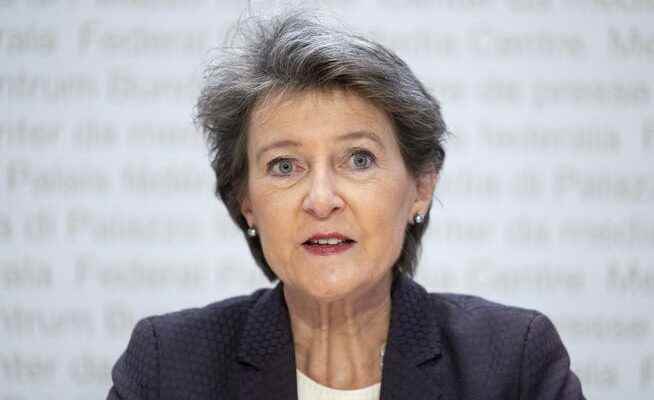Switzerland is in the middle of the biggest energy crisis in decades. Now the country is losing the Federal Councilor of all people who is holding the reins in crisis management.
Walking a fine line between success and failure: Simonetta Sommaruga.
It was probably one of the most difficult appearances in Simonetta Sommaruga’s long political career: the announcement of her resignation because her husband, the writer Lukas Hartmann, recently suffered a stroke. Only very briefly at the beginning did the voice tremble. After that, the Bernese magistrate composed herself: With her usual aplomb, she listed the milestones of her time in the Federal Council to the journalists without revealing anything personal.
No question: With Simonetta Sommaruga, one of the most talented members of the state government is leaving; a political strategist who, during her twelve years in office, did not let defeats deter her from her path. And one who always knew how fine the line can be in politics between success and failure. Perhaps that’s why Sommaruga often proceeded so cautiously, meticulously preparing each step and sounding out roped parties in the bourgeois camp in order to help her templates achieve a breakthrough.
As understandable as Sommaruga’s resignation is, it comes at an unfortunate time. Switzerland is in the middle of the biggest energy crisis in decades. Now she is losing the Federal Councilor who pulls the strings in crisis management and sets the pace in almost all matters.
As the top crisis manager, Sommaruga impressed from the start with her determination. When others were still asleep, she took early action to prevent Switzerland from suddenly being left in the dark this winter. At the same time, it practically single-handedly pushed through a rescue package for the major energy suppliers. A study by the supervisory authorities on the day of her resignation confirmed that she was correct in her crisis planning.
Of course, Sommaruga has not yet solved the energy crisis. Because the biggest challenges will only come to Switzerland in the next few years. Sommaruga can, however, be attested to be able to correct the worst mistakes of her predecessor Doris Leuthard in all likelihood. In September, for example, it brought its most important proposal, the general decree on a secure power supply, through the Council of States without a dissenting vote. If the National Council also agrees to this, the biggest hurdles to the expansion of domestic electricity production will finally be removed. This reduces the risk of a shortage, but does not eliminate it.
Recent successes in energy policy push Sommaruga’s false start as head of the infrastructure department into the background. The SP Federal Councilor lost no fewer than three votes in a row; Political observers already wanted to recognize a certain tiredness in the Federal Councilor. But critics underestimated Sommaruga’s perseverance – and her ability to persuade people, even if they think differently politically.
With the round table on hydropower, Sommaruga achieved a breakthrough by getting environmental associations, the energy industry and the cantons to renounce the blockade policy. Parliament has now turned the initially non-binding agreement into law. In turn, Sommaruga showed up in climate policy after the crash of her CO2law at the ballot box, ready to cancel green climate fantasies and put together a narrow-gauge package that should also be able to win a majority in the middle-class camp.
Now, after her husband’s stroke, Simonetta Sommaruga wants to change her priorities in life. That is understandable. For her successor, however, the task remains the same: to master one of the most serious crises for Switzerland in decades.
